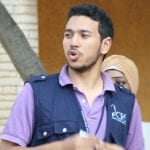STUDENT BLOG #1 | Migration Stream | June 6, 2017
Mohamed Fouad

UASC participating in a session about hopes for the future
With more than 65 million displaced people by the end of 2015, few areas are more worthy of attention than the refugee crises hitting our world. I often say I used to have one of the most rewarding jobs there was. Working in education for refugees in Egypt for the past years, I got in contact with thousands of refugees hailing from more than 20 countries. Still, closest to my heart was the time I worked with UASCs and through this post I would like to share a few parts of this personal experience through an unreferenced post.
UASCs is an abbreviation commonly used for unaccompanied or separated refugee minors. Children separated from their parents and families because of conflict, population displacement or natural disasters are among the most vulnerable cases. Separated from those closest to them, these children have lost the care and protection of their families in the turmoil, just when they most needed them. They face abuse and exploitation, and their very survival most of the times is threatened. They often have to assume adult responsibilities, such as protecting and caring for younger sisters and brothers. Children and adolescents who have lost all that is familiar – home, family, friends, stability – are potent symbols of the dramatic impact of humanitarian crises on individual lives. By definition, un-accompanied minors are those children who have been separated from both parents and other relatives and are not being cared for by an adult who, by law or custom, is responsible for doing so. As for separated children, they are those separated from both parents, or from their previous legal or customary primary care-givers, but not necessarily from other relatives. Those may, therefore, include children accompanied by other adult family members.
Throughout the past years, I have met, designed interventions, delivered workshops, and got invited to the homes of hundreds of unaccompanied or separated refugee minors. Some minors were separated from their families during long and dangerous journeys. Many were sent alone with traffickers and smugglers by parents desperate to deliver their children to safe havens. Others escaped on their own or in groups after witnessing the capture or loss of their parents to violent conflict. The stories were horrifying but they were even worse coming out from children. One would think that going through these tragic events would render all UASCs in need for serious psychological interventions. However, diagnosis actually showed that only a minority needed that after attending psychosocial support sessions.
I wanted to use this space to stress more on the importance of a participatory approach in planning educational interventions especially when it comes to UASCs. Sure, the word “participatory” gets tossed around a lot in development and planners might go through all their checklists designed to ensure the inclusion of all stakeholders in the planning process. However, if we perceive children to be completely helpless, traumatized and in need of direction, it can definitely affect our judgment. I cannot generalize, but for me, UASCs coming from Ethiopia with no resources, no Arabic or English language skills residing in hostile conditions in the slums of Egypt; an Arabic speaking country, were the most resilient and resourceful human beings I’ve ever met.
Are Accelerated Learning Programs (ALP) the most suitable for UASC? Will vocational trainings solve some of their problems? Can Refugee Community Schools (RCS) help them through informal curricula? Is it possible for them to attend public schools in an unwelcoming environment? I believe such resilient children are equipped to have the main voice in answering the questions that affect their future. I am glad to see that some agencies are starting to follow a more empowering approach when planning educational interventions for UASCs but as you might know, a gap seems to always exist between policy and practice.
I enjoyed discussing these issues with my peers, and other experts, at the CEID Launch symposium on Thursday, June 15th.
Mohamed Fouad

Mohamed has extensive work experience as a Child Protection Officer with Catholic Relief Services, and is a student on the MA Education and International Development (EID) programme at the UCL Institute of Education (IOE).
 Close
Close





